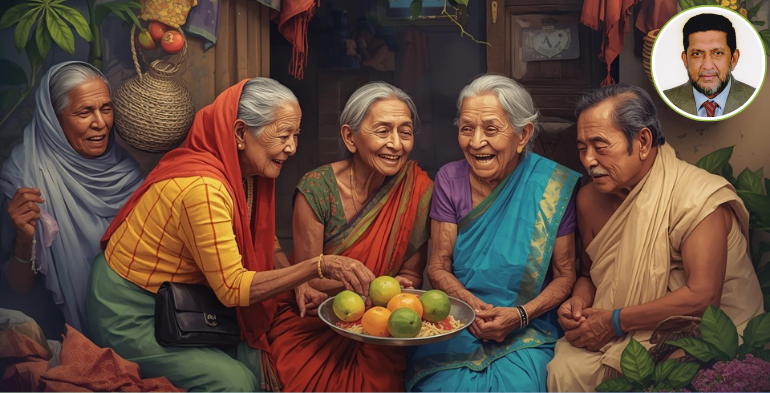
Md. Abu Abdullah: As Bangladesh approaches the International Day of Older Persons on October 1, 2025, the nation stands at a demographic crossroads. With nearly one in ten citizens soon to be elderly, we face a defining choice: will we lead in valuing and empowering our elders, or fall short of this moral imperative? This day is not merely a commemoration but a clarion call for visionary action to ensure our elders’ dignity, well-being, and contributions are upheld.
This year’s theme, “Older Persons Driving Local and Global Action: Our Aspirations, Our Well-Being, and Our Rights,” resonates deeply in Bangladesh, where elders have shaped our nation from the Liberation War to the present. With life expectancy now at 72.3 years, recognizing and investing in our elderly is not just a duty—it’s essential for our collective future.
Established by the United Nations General Assembly in 1990 (Resolution 45/106), the International Day of Older Persons honors those over 60 while addressing barriers to their societal participation. Globally, the elderly population has surged from 541 million in 1995 to 1.2 billion in 2025, projected to reach 2.1 billion by 2050. In Bangladesh, the elderly now constitute 9.5% of the population (over 15 million), up from 7.7% in 2015, and are expected to double to 36 million by 2050. This “silver tsunami” presents both opportunities and challenges for a nation navigating urbanization, climate vulnerability, and economic pressures.
Since 1991, Bangladesh has observed this day with initiatives fostering age-friendly environments. In 2025, expect community workshops on digital literacy, intergenerational dialogues in schools, and media campaigns promoting elder rights. Organizations like the Bangladesh Association for the Aged and the Institute of Geriatric Medicine (BAAIGM) will host health fairs and storytelling sessions, highlighting elders’ roles in sustainable development.
However, the aging process brings challenges. Chronic conditions like cardiovascular disease (CVD), osteoarthritis, and diabetes mellitus significantly impact older adults. CVD, the leading cause of morbidity and mortality, is driven by risk factors like hypertension, smoking, and inactivity. Osteoarthritis causes joint pain and stiffness, manageable through exercise and diet. Diabetes, if uncontrolled, risks heart disease and kidney issues, but lifestyle changes and monitoring can improve outcomes. Dementia, depression, and disability further demand specialized care, whether at home or in institutions, to enhance quality of life.
Despite advances in healthcare, the growing elderly population strains Bangladesh’s systems, increasing costs. Proactive prevention, early intervention, and tailored care are critical to easing this burden. Yet, elders face deeper vulnerabilities—neglect, financial insecurity, and limited access to care. Changing family structures and inadequate geriatric services exacerbate these issues, particularly for women, who are often widowed, poorer, and more isolated. As one elder from Manikganj shared, “We built this country with our hands; now, our hands tremble without help.”
The World Bank’s 2023 “Silver Opportunity” report highlights barriers like high healthcare costs and untrained providers, with geriatric care often sidelined. Unlike neighboring countries, Bangladesh lacks widespread residential or formal home care, leaving many elders adrift. Poverty traps seniors in cycles of malnutrition and exploitation.
Bangladesh’s cultural values, rooted in religious and traditional respect for elders, are under strain from modern economic pressures. The Old Age Allowance program, providing 650 taka monthly to those over 62 (women) or 65 (men), aims for universal coverage by 2025, up from 10% annual beneficiary growth since 2009. Additionally, 34.5 lakh disabled persons receive 900 taka monthly. The Universal Pension Scheme (UPS), launched in 2023, offers tailored retirement options: Pragati for private employees, Surokkha for informal workers, Somota for the impoverished, and Probash for expatriates.
The International Day of Older Persons aligns with several UN Sustainable Development Goals (SDGs): SDG 3: Good Health and Well-Being – Ensuring healthcare access for elders. SDG 10: Reduced Inequalities – Combating age-based discrimination. SDG 11: Sustainable Cities and Communities – Promoting age-friendly environments.
This year’s theme underscores elders as powerful agents of change. Their aspirations, well-being, and rights must guide our actions to eliminate ageism and empower them as community leaders.
The International Day of Older Persons is both a celebration and a challenge. Elders are not passive recipients but sources of wisdom and resilience. By ensuring their rights, dignity, and contributions are recognized, we build a stronger, more inclusive Bangladesh. Investing in our elders benefits not just them but society as a whole—today and for generations to come.
-writer:Former Additional Secretary
























